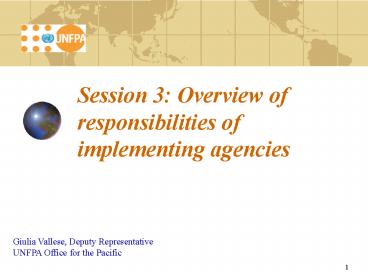Session 3: Overview of responsibilities of implementing agencies - PowerPoint PPT Presentation
1 / 23
Title:
Session 3: Overview of responsibilities of implementing agencies
Description:
Work Plan, Financial Reporting, Report on non-Expendable Property. Audit ... laptops, printers, CD burners, DVDs, Digital cameras, mobile phone, televisions etc. ... – PowerPoint PPT presentation
Number of Views:31
Avg rating:3.0/5.0
Title: Session 3: Overview of responsibilities of implementing agencies
1
Session 3 Overview of responsibilities of
implementing agencies
Giulia Vallese, Deputy Representative UNFPA
Office for the Pacific
2
Topics
- Roles and responsibilities of implementing
agencies incl - Work Plan, Financial Reporting, Report on
non-Expendable Property - Audit
- Feedback on questionnaire
3
An implementing Agency has
- Substantive accountability
- Financial Accountability
- Custodial accountability
4
Modalities for Implementing UNFPA Supported
Projects
- Government Ministry/Department
- NGOs and Regional Organizations
- UN Specialised Agencies such as WHO
- UNFPA as an Implementing Agency
- Split Implementation
5
Key Responsibilities of an Implementing Agency
Partner
- Legally binding
- Signed documents (Impl. Agency and UNFPA). Future
document will consist of Budget and Annual
Workplan - One Letter of Understanding (for Government and
NGOs) for all activities during programme cycle
6
Key Responsibilities of an Implementing Agency
- Establishing and operating financial system. If
possible, open a separate bank account - Quarterly or six-monthly submission of COE -
Certificate of Expenditure (COE) - Annual Workplan and Workplan Monitoring tool for
the quarter with COE linking resources with
results - Summary of Assets (Form C) Annual Expenditures
Forms D and E) - Review and finalisation of annual workplan
- Fostering monitoring and evaluation of activities
and outputs - Ensuring closure of projects once financially and
operationally closed - Ensuring audit based on accounting standards
7
Financial Transactions
- Budget allocated on yearly basis
- Budget Revisions
- Supplementary approvals
- Different funding modalities
- Direct payment
- Reimbursement
- Advance
- Grants/service contracts for specific activities
8
Commitment
- Commitment of UNFPA
- Commitment to specified budget based on signed
LOU, subject to availability of funds - Commitment to specified amount from other
resources subject to donor interest - Commitment of Government
- A statement of government's contribution (in kind
or monetary contribution to the CP - Commitment to support UNFPA in raising funds
required to meet the financial needs of the
country programme (assist in developing Resource
Mobilisation Strategy) - Commitment to review implementation and take
corrective actions
9
Financial reportingCertificate of Expenditure
(COE)
- Following Reporting period
- Quarterly Advance Quarterly Expenditure
Deadline - Qrt 2 May-Jul Qrt 1 Jan Mar 30 April
- Qrt 3 Aug-Oct Qrt 2 Apri Jun 31
July - Qrt 4 Nov - Jan Qrt 3 Jul Sept
30 Oct - Qrt 1 Feb-Apr Qrt 4 Oct Dec
15 Dec for expend - 31 Jan for Advance
- Six Monthly Reporting
- Advance Six monthly expenditures Deadline
- 1 July 30Dec 1 Jan 30 June 31 Jul
- 1 Jan 30June 1 July 31 December 15 Dec
for Expend - 31Jan for advance
10
COE
11
COE- Quarterly/Six-monthly Advance
- What needs to be submitted
- Workplan for Advance breakdown by Activity ID in
local currency. Workplan Monitoring Tool when
reporting (see ME session)
12
Asset Management Non expendable property
- Definition
- Any item which costs USD1,000 FOB and which
has a service life time of at least three years.
In addition, items regarded as attractive items
shall also be included on the Form - Attractive Items laptops, printers, CD burners,
DVDs, Digital cameras, mobile phone, televisions
etc..
13
Form C Non expendable property report
- Form C should clearly mark
- A) The date of acquisition
- B) Equipment Number and description
- C) Serial Number
- D) The cost
- E) Location
- Only include items which have not been officially
transferred to implementing agency
14
Annual Year End Forms
- Annual Status of Funds Report
- Annual Disbursement Report
- Both reports have to be certified and included as
part of the audit
15
Audit outline
- 1) Definition GVT NGO implemented projects -
Accountability - 2) Audit Plans
- 3) Audit Reports - requirements scope
- 4) Assessment and Action Plan
- 5) Evaluation of Audit Reports
- 6) Policies and procedures
16
Audits Government and NGO implemented projects
- Governments or Non-Governmental organizations
(NGOs) assume responsibility for ensuring the
adequacy of the overall supervision and
management of UNFPA-financed component projects - Accountability financial, custodial, substantive
17
Audit Plan
- Need to submit to the Audit Services Branch (ASB)
HQ by 31 October each year - Audit Plan includes the following
- 1) Estimated expenditures
- 2) estimated audit costs
- 3) and name of audit entity
18
Audit Report
- Audit reports to be submitted by 31 March each
year - Audits performed by
- Government Auditors (Auditor General)
- Contracted professional accounting firms
- Originals of the reports should be submitted
19
Audit Report - Scope
- Audit Scope includes the review of
- Project internal controls
- Accounting books and records
- Certification statements
- Financial Forms (accuracy and timeliness of
submission) - Closure requirements if project is closed
20
Audit Report
- Audit reports should include
- Audit opinion
- Management Letter audit observations,
recommendations and management comments - Certified financial forms
21
Evaluation of audit reports-Example of Audit
observations
- Audit reports submitted late or not submitted for
some projects - Financial Forms not included in the report or not
certified - Management action plans not submitted
- Specific Audit Issues
- Bank reconciliation not performed.
- Supporting documentation for expenditures not
available or not adequate - Non-expendable equipment not tagged and physical
inventory not performed - Quotations for purchases not obtained
22
Project Closure
- Operationally closed all activities completed
- Inventory of Non-expendable equipment
disposed/transferred - Financially completed all funds accounted for
or returned to UNFPA - Way forward SWAPs, Budget Support?
23
Thank you!































